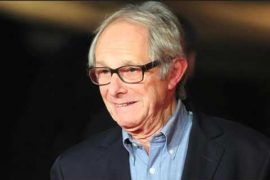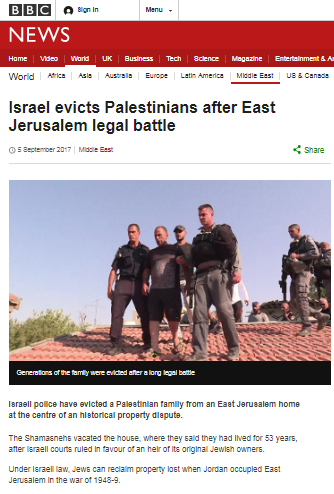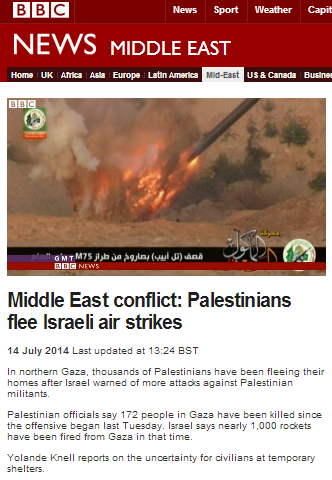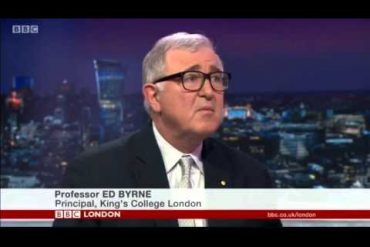On February 25th viewers of BBC television news saw two filmed reports from Shuja’iya in the Gaza Strip by the corporation’s chief international correspondent Lyse Doucet. One of Doucet’s other reports produced during the same visit was previously discussed here.
Both filmed reports also appeared on the BBC News website’s Middle East page, with the earlier one going under the title “Gaza resident: ‘Everyone has forgotten us’“. In Doucet’s dramatic introduction to that report we learn that she does not understand the difference between smoke and dust.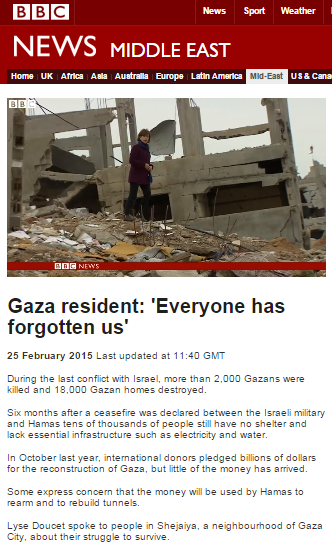
“War pulled life from the heart of Gaza. It left a wasteland. Smoke still rises. Today it’s only a digger clearing some of the rubble. Gazans put up signs to describe what stood here, which family lost it, what number to call to deliver help. But almost none has arrived.”
Offering no factual evidence for her claim that a house in a neighbourhood riddled with missile launching sites, booby-trapped Hamas command centres and weapons stores was destroyed by “Israeli artillery fire” and failing to clarify that the cause of death she cites has not been confirmed by medical professionals, Doucet continues:
“The Khesi family’s home was destroyed in Israeli artillery fire. Just before the ceasefire six months ago, their first son, Wadie, was born. Last month he froze to death in what is now another battle just to survive.”
She goes on:
“His grandmother Fati’a [phonetic] points an accusing finger at all Arab countries, saying they haven’t helped Gaza. Wadie’s mother says nobody did.”
Voiceover mother: “All countries take care of their children and people. All countries except here. Here the people in charge just sit on their chair. They care only for their own children. They forget about us.”
Doucet: “Now they just want to rebuild their home so that their two girls will survive.”
This would obviously have been an appropriate juncture to explore the subject of the performance of both Gaza’s de facto Hamas government and the Palestinian Unity government (which supposedly has been in charge of the Gaza Strip since last June) in helping the local population to get back on its feet after the summer war initiated by Hamas. Doucet’s treatment of that topic is exceptionally superficial. She continues:
“Everyone talks about rebuilding Gaza but nobody’s doing it. And as always here, there’s more than one reason. Israeli restrictions, Palestinian infighting, the failure of donors to keep their promises. And why would there be much rebuilding when everyone fears there’ll be another war?”
Doucet then interviews UNRWA’s deputy director of Gaza operations, Scott Anderson.
Doucet: “Ten thousand Gazans still live in UN schools and that number may rise when families’ money runs out.”
Anderson: “You think conflict’s inevitable, whether it’s internal conflict or another conflict between Gaza and Israel. Unless the situation on the ground changes there will be no other action for people to take other than the resumption of violence.”
Doucet apparently has no comment to make regarding the promotion by a UN representative of that very thinly veiled threat of violence in the absence of cash handouts which comes straight out of the Hamas handbook. She goes on:
“And Hamas fighters are ready: they don’t hide it. I’ve seen marches like this on almost every visit in recent months.”
The question BBC audiences will no doubt be asking themselves at this juncture is why, if that is the case, it has taken Doucet six months to get around to mentioning those marches organized by a terrorist organization she declines to name as such. Doucet then gets Hamas’ Ghazi Hamad on camera but, instead of posing any incisive questions about his organisation’s responsibility for the conflict and its aftermath, she merely provides him with a stage from which to promote the usual propaganda unhindered.
Hamad: “Main reason for all this catastrophe is the occupation. Now Gaza’s turned to be like a big prison. There’s no exit, no import, no export.”
Not only does Doucet fail to clarify to viewers that the Gaza Strip has not been under “occupation” since August 2005, she makes no effort to correct the inaccurate impression received by audiences as a result of Hamad’s lies.
In January 2015 alone, 15,205 tons of construction materials were imported into the Gaza Strip. Since the end of the conflict, 50,000 tons of building materials have entered the Strip and more than 42,000 residents have purchased them. 804 tons of agricultural produce were exported from the Gaza Strip to the PA controlled areas in January, bringing the total tonnage of merchandise exported to that destination since September 2014 to 2,130. 11,826 people crossed into Israel from the Gaza Strip in January alone – 2,038 of them for humanitarian reasons. 3,054 tons of gas entered the Gaza Strip during January, along with 1.8 million litres of fuel, 6.8 million litres of gasoline and 76,000 litres of oil.
Doucet continues:
“But there are reports – credible reports – that Hamas is again digging tunnels, that Hamas has been test-firing missiles in preparation for the next war.”
Hamad: “Look, I think this time – that’s right – but I think that Hamas is doing this in order to protect our people here. We don’t want to be surprised with a new war – a new aggression against us.”
In addition to displaying no interest whatsoever in questioning Hamad about where the money and materials for rehabilitation of Hamas’ military capabilities are coming from and why Hamas is doing nothing to improve the lives of the ordinary people it holds hostage, Doucet also makes no attempt to enlighten viewers with regard to the fact that Hamad’s faux victimhood is mere propaganda. Instead of pointing out that Hamas initiated last summer’s conflict she closes with yet more drama and unsupported speculations.
“In the ruins of Gaza young men train in Parkour – the sport of overcoming obstacles. Resilient Gazans are good at that. But after three wars in six years, even the strongest are starting to break.
Clearly BBC audiences learned nothing new from this superficial and mediocre reporting which merely regurgitates the same themes promoted by the BBC time and time again. Moreover, in addition to failing to provide viewers with the real facts and background to the issue of reconstruction in the Gaza Strip, Doucet once again self-conscripted to the cause of promotion of Hamas propaganda. The BBC’s funding public which paid for Lyse Doucet’s trip to Gaza must surely be asking themselves how her reporting can possibly be termed value for money.
Doucet’s second filmed report will be discussed in an upcoming post.

